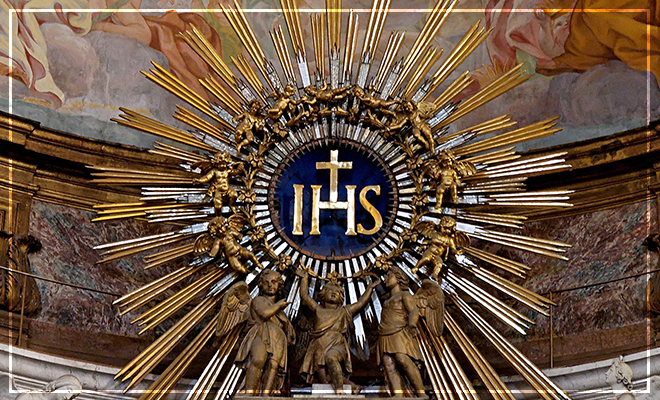In the Roman Catholic Church we often forget about the power of Jesus’ name, while the Eastern Church (both Byzantine and Orthodox), has an ancient tradition of reciting what is called the “Jesus Prayer.” It is a prayer that if prayed with great faith, has the potential to both deepen our own piety as well as drive away the advances of the Evil One.
[featured-image single_newwindow=”false”]
Before we examine the “Jesus Prayer,” let us hear about the power of Jesus’ name from Saint Bernadine of Siena, who was a strong promoter of the Holy Name of Jesus:
“The name of Jesus is the glory of preachers, because the shining splendor of that name causes his word to be proclaimed and heard. And how do you think such an immense, sudden and dazzling light of faith came into the world, if not because Jesus was preached? Was it not through the brilliance and sweet savor of this name that God called us into his marvelous light? When we have been enlightened, and in that same light behold the light of heaven, rightly may the apostle Paul say to us: Once you were darkness, but now you are light in the Lord; walk as children of light….
By word of mouth, by letters, by miracles and by the example of his own life, Saint Paul bore the name of Jesus wherever he went. He praised the name of Jesus at all times, but never more than when bearing witness to his faith. Moreover, the Apostle did indeed carry this name before the Gentiles and kings and the sons of Israel as a light to enlighten all nations. (From a sermon by Saint Bernadine of Siena)”
The Desert Fathers followed after the example of St. Paul and desired to utter the name of Jesus “without ceasing” (1 Thess. 5:17). They developed this refrain to be said continually throughout the day:
Lord Jesus Christ, Son of God, have mercy on me, a sinner.
The “Jesus Prayer” is extremely simple, but has deep roots in scripture. It stems from the “cry of the blind man sitting at the side of the road near Jericho, ‘Jesus, Son of David, have mercy on me’ (Luke 18:38); the ten lepers who ‘called to him, Jesus, Master, take pity on us ‘ (Luke 17:13); and the cry for mercy of the publican, ‘God, be merciful to me, a sinner’ (Luke 18:14) (goarch.org).
The Eastern Church provides some guidelines in reciting this prayer, lest it become a useless “prattle.” This comes from St. Theophan the Recluse:
- It begins as oral prayer or prayer of the lips, a simple recitation which Theophan defines as prayers’ “verbal expression and shape.” Although very important, this level of prayer is still external to us and thus only the first step, for “the essence or soul of prayer is within a man’s mind and heart.”
- As we enter more deeply into prayer, we reach a level at which we begin to pray without distraction. Theophan remarks that at this point, “the mind is focused upon the words” of the Prayer, “speaking them as if they were our own.”
- The third and final level is prayer of the heart. At this stage prayer is no longer something we do but who we are. Such prayer, which is a gift of the Spirit, is to return to the Father as did the prodigal son (Luke 15:32). The prayer of the heart is the prayer of adoption, when “God has sent the Spirit of his Son into our hearts, the Spirit that cries ‘Abba, Father!'” (Gal. 4:6). (goarch.org)
The power of the Holy Name of Jesus is also important in spiritual warfare.
Father Roger was just over five foot tall. A very spiritual priest, he was much involved in the healing ministry, exorcism and visiting prisons and mental hospitals. He told me that one day he was walking down the corridor of a mental hospital when around the corner came a huge man–well over six foot tall and three hundred pounds. He was bellowing out blasphemies and was rushing straight for Roger brandishing a kitchen knife.
Roger stopped and said, “In the name of Jesus, drop the knife!”
The man halted. Dropped the knife and turned and walked away as meek as a lamb. (Standing on my Head)
So let us keep the Holy Name of Jesus always on our lips, for
“[A]t the name of Jesus every knee should bow, in heaven and on earth and under the earth, and every tongue confess that Jesus Christ is Lord, to the glory of God the Father.” (Philippians 2:9-11)
Read the Entire Series
- Why We Need Spiritual Direction
- 8 Rules for the Discernment of Spirits
- 10 Ways John Paul II Defeated the Influence of Satan

